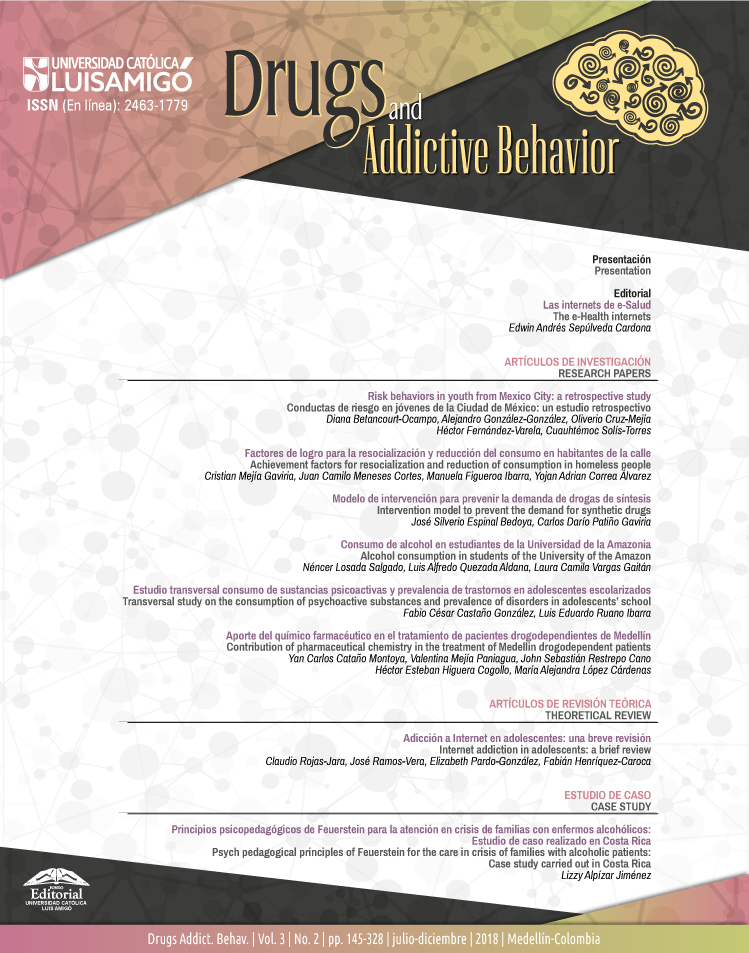Contribution of pharmaceutical chemistry in the treatment of Medellin drogodependent patients
DOI:
https://doi.org/10.21501/24631779.2871Keywords:
Company Papá Vanegas, Drugs, Drug addiction, Physiology, Pharmaceutical Chemist, Rehabilitation, Psychoactive substancesAbstract
Background: Drug addiction is a disease that affects people physically, mentally and socially; This is why it gets necessary for patients with this condition to be treated in a multidisciplinary way. Objective: To describe the contribution of the Pharmaceutical chemist in the treatment of drug addiction with patients from Papá Vanegas corporation which is
located in Medellin city. Method: The methodology used was qualitative with participatory action research strategy, a nonprobabilistic sampling was performed with a sample of 40 people, using research instruments such as interviews, field diary, life histories. Results: After the interventions made by the students of Pharmaceutical Chemistry, the participants highlighted their intention to internalize the knowledge acquired about the mechanisms of action, anatomical and physiological effects, diseases derived from the abuse of these substances and the importance of an adequate diet, highlighting a great interest in
personalized pharmaceutical care as drug interactions due to the polypharmacy presented by some of the patients referred to their different pathological conditions. Conclusion: it was found that the Pharmaceutical Chemist is indispensable in the process of rehabilitation drug-dependent patients because these professionals know about active principles and psychoactive substances. The actions performed by the professional allowed the patients to understand the physio anatomic damages of the pathological consumption of drugs.
Downloads
References
Balcázar, F. E. (2003). Investigación acción participativa (IAP): aspectos conceptuales y dificultades de implementación. Fundamentos en Humanidades, 4, 59-77. Recuperado de https://dialnet.unirioja.es/servlet/articulo?codigo=1272956
Camprubí García, J. (Enero, 1987). Un nuevo marco conceptual en el tratamiento de la drogadicción. Gaceta Sanitaria, 1(3), 95–96. doi: 10.1016/S0213-9111(87)70888-7
Congreso de la República de Colombia. (1995). Ley No. 212 del 26 de octubre de 1995. “Por el cual se reglamenta la profesión de químico farmacéutico y se dictan otras disposiciones”. Recuperado de http://www.secretariasenado.gov.co/senado/basedoc/ley_0212_1995.html
Corporación Papá Vanegas. (s. f.). Principios, valores, misión y visión documento. Recuperado de http://www.corporacionpapavanegas.com/empresa.php
National Institute on Drug Abuse (s. f.). Información sobre drogas. Recuperado de https://www.drugabuse.gov/es/informacion-sobre- drogas
Organización de los Estados Americanos. (2012). El problema de las drogas en las Américas. Estudios: drogas y salud pública. Washington, DC. Recuperado de http://www.cicad.oas.org/drogas/elinforme/informeDrogas2013/drugsPublicHealth_ESP.pdf
Organización Mundial de la Salud [OMS]. (s. f.). Alcohol. Recuperado de http://www.who.int/mediacentre/factsheets/fs349/es/
World Health Organization. (2008). Glosario de términos de alcohol y drogas. Madrid, España: Organización Mundial de la Salud. Recuperado de http://www.who.int/substance_abuse/terminology/lexicon_alcohol_drugs_spanish.pdf
Downloads
Published
How to Cite
Issue
Section
License
INTELLECTUAL PROPERTY
The authors are morally and legally responsible for the content of their articles, as well as respect for copyright. Therefore, these do not compromise in any way the Luis Amigó University Foundation.
The reproduction of the articles will be governed as described in http://creativecommons.org/
PUBLICATIONS POLICY
• The author must send the statement of assignment of economic rights and the declaration of conflicts of interest in favor of the journal. Said document will be provided by the Editor and indicates the originality of the article, which is not published and which is not simultaneously postulated in another medium.
• The address of the journal Drugs and Addictive Behavior will confirm to the author, in a maximum of three (3) days, the reception of the received contribution, if its sending is done through the electronic mail; or immediately, if it is entered through the OJS (Open Journal Systems). The reception of articles does not imply an obligation to publish them.
• The journal Drugs and Addictive Behavior will submit the articles received for initial evaluation by the Editorial Committee; In case the Committee finds the material relevant, it will be evaluated by anonymous arbitrators, who will determine if it is publishable.
• Once the evaluation of the article has begun, the authors agree not to remove it in any part of the process.
• Printed items will not be received. All the proponents will have to send their writings through the e-mail of the magazine or the OJS.
• Partial versions of the text will not be received, that is, those that the author considers to modify and that are not structurally adjusted to a type of article.
• Once the article is sent, it is understood that the author authorizes the publication of their contact information and institutional affiliation.
• The authors are directly responsible for the ideas, judgments and opinions expressed in the articles; in such a way that the content does not compromise the thinking of the Editorial Committee or the Institution.
ETHICS OF PUBLICATION
• The Editorial Committee, by virtue of transparency in the processes, will ensure the academic quality of the journal.
• Causes of rejection are considered: plagiarism and self-plagiarism, adulteration, invention or falsification of content and author data, and that the article is not original and unpublished.
• The editor will verify the relevance of the article, in accordance with the policies of the journal and supported by Turnitin's Originality Check, software that detects errors in the handling of appointments, possible copies and plagiarism. If it considers it viable, it will send the article to the arbitrators; otherwise it will report the findings to the author and discard it. The articles must have a minimum originality level of 75%.
• In no case, the journal's management will require the author to cite it or publish articles with conflicts of interest.
• If once the article is published: 1) the publisher discovers plagiarism, adulteration, invention or falsification of data of the content and the author or substantive errors that attempt against the quality or scientificity, may request its removal or correction. 2) A third party detects the error, it is the obligation of the author to retract immediately and proceed to the public removal or correction.
• The opinions contained in the articles are attributable exclusively to the authors; therefore, the Institution is not responsible for what they may generate.


